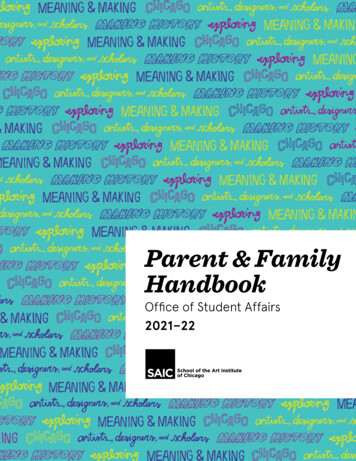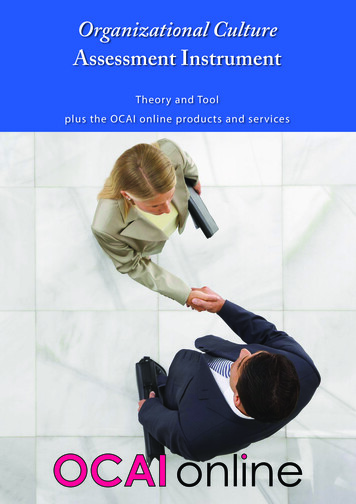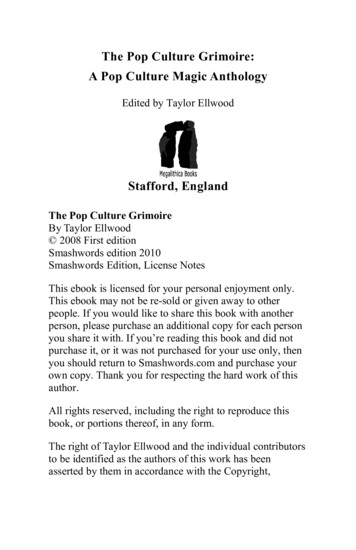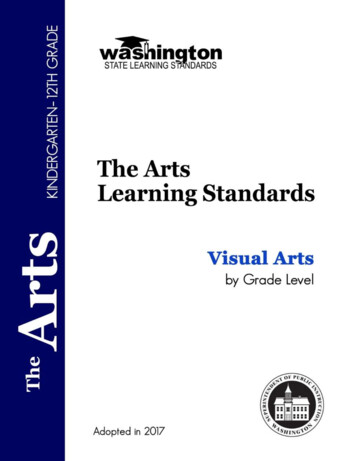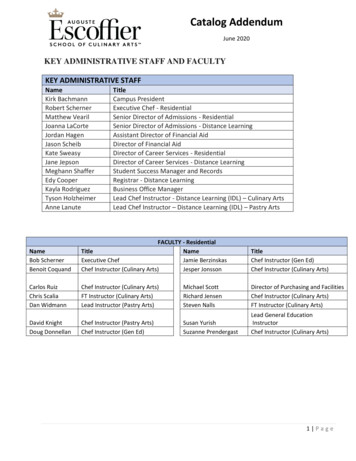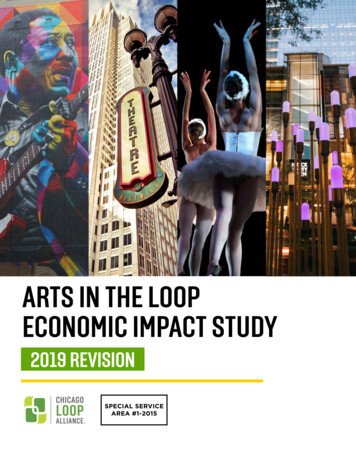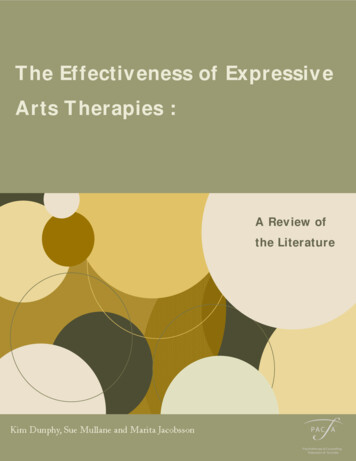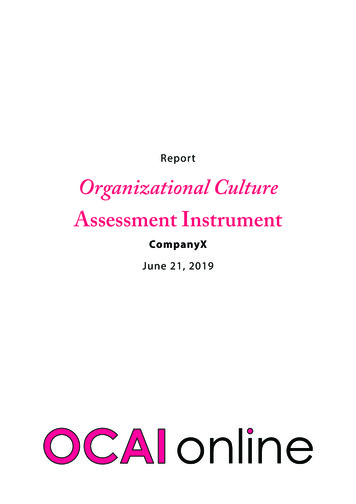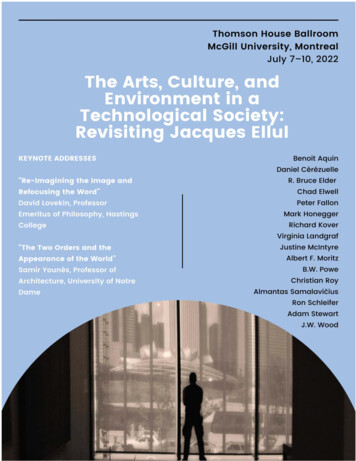
Transcription
The Arts, Culture, and Environment in a Technological Society: Revisiting Jacques Ellul (Montreal, July 8-9, 2022)1
The Arts, Culture, and Environment in a Technological Society: Revisiting Jacques Ellul (Montreal, July 8-9, 2022)2
The Arts, Culture, and Environment in a Technological Society: Revisiting Jacques Ellul (Montreal, July 8-9, 2022)2022 CONFERENCE PLANNING COMMITTEEAllyson Rogers (Chair)David LovekinChristian RoyAlbert F. MoritzSPECIAL THANKSTed Lewis, IJES Executive DirectorDavid Gill, IJES PresidentKen Morris, IJES TreasurerBliss Ward, Post-Graduate Students’ Society (PGSS) House Coordinator, Thomson HouseAlexandre Piral, Public Programs Manager, Fonderie DarlingLAND ACKNOWLEDGEMENTWe acknowledge that our meeting takes place on Kanien’kehá:ka territory, the unceded land on whichMcGill University is located, which knows a long history of occupation and has been stewarded byIndigenous peoples for millennia through to the present day. We affirm the inherent and Treaty Rights ofall Indigenous Peoples, and respect their unending commitment to the care of this land.3
The Arts, Culture, and Environment in a Technological Society: Revisiting Jacques Ellul (Montreal, July 8-9, 2022)WORDS OF WELCOMEDear friends,It is our distinct pleasure to welcome you to the 2022 Conference of the InternationalJacques Ellul Society (www.ellul.org). Founded in 2000 in partnership with theAssociation Internationale Jacques Ellul (www.jacques-ellul.org), the IJES is a communityof scholars and activists committed to preserving, interpreting, and extending the heritageof Jacques Ellul (1912–94). The IJES publishes a journal, The Ellul Forum, and supportsprojects to translate, publish, and reprint writings by and about Jacques Ellul (many ofthem at Wipf & Stock Publishers: www.wipfandstock.com). Since 2012, the IJES hasorganized biennial conferences, starting with its 2012 Centennial Conference at WheatonCollege (Ellul was born in 1912). In 2014 our theme was "Communicating Humanly in anAge of Technology and Spin” at Carleton University in Ottawa. In 2016 we met at theUniversity of California in Berkeley to consider “Politics Without Illusion, RevolutionWithout Violence.” In 2018 our theme was “Jacques Elul and the Bible” at Regent Collegein Vancouver. Our planned 2020 conference in Strasbourg, co-sponsored with the AIJE,on “Ellul & Charbonneau on Ethics and Ecology” was downsized and delayed by theCovid pandemic to earlier this year. Our upcoming 2024 Conference is tentativelyplanned for Chicago and will celebrate the 70th anniversary of Ellul’s most famousbook, La Technique, ou l’enjeu du siecle” (ET 1964, The Technological Society). Wewelcome you to our Montreal gathering and invite you to be an ongoing part of ourcommunity.Bon colloque !2022 Conference Planning Committee4
The Arts, Culture, and Environment in a Technological Society: Revisiting Jacques Ellul (Montreal, July 8-9, 2022)CONFERENCE PROGRAM“The Arts, Culture, and Environment in a Technological Society: Revisiting Jacques Ellul”Thomson House Ballroom, McGill University, MontrealJuly 8-9, 2022Thursday, July 7Pre-conference symposium: “Music and Antifascism: Reflections on the Past andPossibilities in the Present”8:30am – 5:30pm, Thomson House Ballroom, McGill University7:30pm – IJES welcome reception at La Sala Rossa, 2nd floor restaurant4848 Saint-Laurent Blvd.9:00pm – Concert at La Sala Rossa (3rd floor venue)Sunk Heaven (noise, NYC)Nick Schofield (environmental electronic music artist, Montreal)The Egyptian Cotton Arkestra (free improvisation, Montreal)Friday, July 89:00am – RegistrationCoffee, tea, croissants, and fruit providedThomson House Ballroom9:30-9:45 - Opening remarks, Allyson Rogers & David Gill9:45-10:45 –Session #1: Art and Technology Beyond IdolatryChair: Peter Fallon“Does the end of Art signify the end of man? Beyond the technical system: theplace of lyricism in our conception of water”Justine McIntyre, HEC Montreal“Beyond Technological Idolatry: Jacques Ellul and the Potential IconoclasticAesthetic of Wind Power”Richard Kover, University of Alberta10:45-11:00 – break5
The Arts, Culture, and Environment in a Technological Society: Revisiting Jacques Ellul (Montreal, July 8-9, 2022)11:00-12:00 – Session #2: Culture in a Contested Media LandscapeChair: David Lovekin“Art as Propaganda in the Israeli-Palestinian Conflict”Ron Schleifer, Ariel University“Jacques Ellul: Technology and the Problem of Art”Peter Fallon, Roosevelt University12:00-1:15 – Lunch provided on-site1:15-2:45 – Keynote address“Re-Imagining the Image and Refocusing the Word”David Lovekin, Professor Emeritus of Philosophy, Hastings College2:45-3:00 – break3:00-4:30 – Session #3: Artistic Practice Between Word and ImageChair: Lisa Richmond“La dimension éthérique du réseau par Anton Bequii”Benoit Aquin, contemporary artist, Montreal“The Word Made Image: Applying Ellul to Artistic Practice”J. W. Wood, author“'The saddest songs are often the most beautiful': The Secret Centrality of thePoetic in the Sociology of Jacques Ellul”Al Moritz, professor/poet, University of Toronto6:30pm– Banquet dinner, Thomson House BallroomAfter-dinner program: R. Bruce Elder presents his experimental film 1857 Fool’s Gold(1981, 25 min.), drawing on Defoe’s Journal of the Plague Year and Pound’s Cantos.R. Bruce Elder is a filmmaker, critic. Retrospectives of his work have been presented byAnthology Film Archives (NY), the Art Gallery of Ontario, Cinématheque Québecoise, IlFestival Senzatitolo (Trento), Images Festival (Toronto) and Paris’ Festival des CinémasDifférents, EXiS (in Seoul, Korea), Circulo de Bellas Artes (Madrid) and Cineteca nacional deMéxico. In announcing their “Tribute to R. Bruce Elder” Cinematheque Ontario proclaimed:“R. Bruce Elder is not only one of Canada's foremost experimental filmmakers, he's one of6
The Arts, Culture, and Environment in a Technological Society: Revisiting Jacques Ellul (Montreal, July 8-9, 2022)our greatest artists, thinkers, critics, and filmmakers, period.” He was an early user of digitalimage processing techniques in filmmaking and was awarded a Council/NSERC New MediaInitiatives grant, a Ryerson Research Chair, and grant from the Social Sciences andHumanities Research Council of Canada to apply machine learning to filmmaking. Otherawards include the Governor General’s Award in Media Arts, a Canadian Screen Award, LosAngeles Film Critics Award. In 2007, Elder was elected a Fellow of the Royal Society ofCanada. He has published many articles and books, including Harmony & Dissent (2008),which received the prestigious Robert Motherwell Book Prize from the Dedalus Foundation,was named a Choice Outstanding Academic Book and was shortlisted for the ASPP’sRaymond Klibansky award (now the Canada Humanities Award).Saturday, July 98:30am – Coffee, tea, croissants, and fruit provided9:00-10:00 – Session #4: Musical Performance Between Tradition and TechnologyChair: Allyson Rogers“The Irish Traditional Session and Improvisational Musical Gatherings asOpposition to Technique”Chad Elwell, independent researcher/musician, Chicago“Technique and Unsustainable Aspects of Sacred Harp Singing Culture”Virginia Landgraf, ATLA Religion Database10:00-10:15 – break10:15-11:15 – Session #5: The Ambivalence of Art in a Technological SocietyChair: Christian Roy“Technique et désincarnation : Approches de l’esprit du technicisme”Daniel Cérézuelle, independent researcher, Bordeaux(paper will be read by Christian Roy)“Modern Art in Technological Society for the Toronto Schooland the Bordeaux School: Probe or Drug?”Christian Roy, independent researcher, Montreal11:15-12:45 – Lunch off-site7
The Arts, Culture, and Environment in a Technological Society: Revisiting Jacques Ellul (Montreal, July 8-9, 2022)1:00-2:30– Session #6: Potentials and Prospects of Culture and TechnologyChair: Al Moritz“Psychopedagogic Technique, the Art of Teaching, and the Fight for the Soul of theUniversity”Adam Stewart, Crandall University“Where is the Fiction? Art’s Audience in a World of Technique”Mark Honegger, University of Louisiana“One Must be Absolutely Hypermodern: Reflecting on Jacques Ellul, Teilhard deChardin, Marshall McLuhan, Simone Weil, Anne Carson”B. W. Powe, professor/poet, York University2:30-2:45 - break2:45-3:45 – Session #7: Institutional Space and Issues of ScaleChair: Allyson Rogers“Art, Architecture, and the Limits to Technology”Almantas Samalavicius, Vilnius Gediminas Technical University“E. F. Schumacher and Jacques Ellul on Economics and Technology”Robert Leonard, Université du Québec à Montréal3:45-4:00 - break4:00-5:30 – Keynote address and closing remarks“The Two Orders and the Appearance of the World”Samir Younès, Professor of Architecture, University of Notre Dame6:30pm - Dinner out downtownSunday, July 1010:30am – Guided tour of the exhibition: “Feedback #6: Marshall McLuhan and the Arts”(curator: Baruch Gottlieb, for West Den Haag contemporary art institute, The Hague)Fonderie Darling, 745 Ottawa Street (near Old Montreal)8
The Arts, Culture, and Environment in a Technological Society: Revisiting Jacques Ellul (Montreal, July 8-9, 2022)KEYNOTE ADDRESS“Re-Imagining the Image and Refocusing the Word”David Lovekin, Professor Emeritus of Philosophy, Hastings CollegeIn “Re-Imagining the Image and Re-Focusing the Word,” I consider Ellul’s claim that in thetechnological society symbols were no longer possible. I view this in relation to his notionof the humiliated word in its reduction to the image. I discuss the way in whichtechnological consciousness produces a world of images as technical phenomena. Theseimages do not function as images that allowed the unseen as the other side of the image.Thus, these images are humiliated along with words. The tension between the dimensionsof the image and the word make the symbol possible. Fundamental to human experienceis the tension between subject and object, spirit and body in symbolic production. Here,I bring in Ernst Cassirer’s notion of the symbolic form, which is the work the spirit performsas it enters the material world. A view of an object benefits from a feeling of “symbolicpregnance,” a calling out for respect, attention, and a name. To deprive nature, culture,and those beings within those domains of such pregnance is to commit symbolic suicide,a death perhaps not noticed by those adrift in the sees of images. I then show some of myphotographs that attempt to reveal the presence of absence in the world around me andto challenge the reality before me.David Lovekin is Professor of Philosophy Emeritus at Hastings College, Hastings, NE USA. Heis the author of Technique, Discourse, and Consciousness: An Introduction to the Philosophyof Jacques Ellul, co-editor with Donald Phillip Verene of Essays in Humanity and Technology,co-editor with David Gill of Political Illusion and Reality (2018) and co-translator with SamirYounès of Jacques Ellul’s The Empire of Non-Sense, a critique of modernist art. He haspublished numerous essays on Ellul and Giambattista Vico that deal with technology as aproblem for the philosophy of culture in the spirit of Ernst Cassirer with the idea oftechnology as a symbolic form. He is contributing editor of The Ellul Forum and serves as amember of the International Jacques Ellul Society. Lovekin has been a recipient of fiveNational Endowment for the Humanities Grants. His photography has been published innumerous books and periodicals; his most recent work appears on covers of the PrairieSchooner, the literary magazine of the University of Nebraska, Lincoln, and in the ModernArts/Midwest, Midtown gallery in Omaha, Nebraska. He paints abstractions in acrylics andis currently doing ink painting in the sumi-e style.9
The Arts, Culture, and Environment in a Technological Society: Revisiting Jacques Ellul (Montreal, July 8-9, 2022)“The Two Orders and the Appearance of the World”Samir Younès, Professor of Architecture, University of Notre DameThe visual arts have been deeply marked by the confluence of several phenomena thatproduced a crisis of long duration since the middle nineteenth century. Among thesephenomena is a philosophy of history called historicism and incident concepts that werejoined to it such as the association of teleology with progress, periodization and stylisticruptures, the zeitgeist(er) and the weltanschauung(en), and technological determinism. Themerging of art theory with these philosophical concerns served to establish a culturalcondition called artistic modernism which found its justification in the massivetechnological forces that stood outside the visual arts. Modernism was offered as the onlyform of modernity that is acceptable, indeed possible. It happened, we were told, as if bynecessity. Although in The Empire of Non-sense J. Ellul engaged modernist art theoryaccording to its own tenets, the essence of his argument explained that much in modernistart and the theories that justify it came from a technologically determined view of the worldwhich was being brought to bear on the arts from the outside. Because the formidabletechnological processes and products are an empire of means, they plunged the arts into acrisis of long duration, as the protagonists of modernism came to consider the crisis itselfas a necessary requirement for contemporary art. This cultural condition, althoughdominant, has been strongly criticized since the late 1970s, and solid reforms have beenenacted ––reforms that clarify the nature(s), the purpose(s), and the means of the visualarts as part of a poetic order that has been eclipsed by the technological one, but as alleclipses, this one is temporary.Samir Younés is Professor of Architecture at the University of Notre Dame. His writingsfocus on architectural theory, aesthetics, and the intersecting areas of the philosophy ofhistory and cultural philosophy. He was Director of Graduate Studies (1993-99) and Directorof Rome Studies (1999-2009) at Notre Dame. Younés' books include: The True, the Fictiveand the Real, Quatremère de Quincy's Historical Dictionary of Architecture; The ImperfectCity: On Architectural Judgment; The Intellectual Life of the Architect. His most recent book,Architectural Type and Character was released in January of 2022. Younés’ projects andessays on architecture, art, and aesthetics have appeared in Architectural Design, TheJournal of the Royal Institute of Philosophy, The Journal of Urban Design, Archi e ColonneInternational, Quadri e Sculture, Il Covile, American Arts Quarterly, The Bulletin of Science,Technology and Society. Younés has lectured at many universities around the worldincluding the École des Beaux-Arts, Paris; the Università degli Studi di Roma “La Sapienza”;the Università degli Studi di Bologna; the Universidad politécnica de Madrid; The Prince ofWales’ Institute for Architecture, London; Yale University; Clemson University; theUniversity of Miami; the University of Maryland.10
The Arts, Culture, and Environment in a Technological Society: Revisiting Jacques Ellul (Montreal, July 8-9, 2022)CONFERENCE PRESENTERSAquin, Benoit. “La dimension éthérique du réseau par Anton Bequii”For over three decades, Benoit Aquin has conducted photographic research on the modesof human existence and the tragic convergence of environmental and spiritual upheavals.At the turn of the century, he began a series of projects of a predominantly ecologicalnature. La Chasse (2002-2009) portrays the relationship between Quebec hunters and theirenvironment; Le Grand Nord (2004) reveals the repercussions of climate change on theancestral practices of the Inuit. Le Dust Bowl chinois (2006-2009), an investigation ofanthropogenic desertification in northern China, was awarded the inaugural Prix Pictet in2008. A monograph entitled Far East Far West (2009) closed the cycle. His attention thenturned to the subject of agriculture and world hunger, as reflected in his documentary LesDépossédés (dir. Mathieu Roy, 2016) and a series entitled L’Agriculture au Québec, unphoto-roman d’anticipation (2015). His book Mégantic (2015) depicts the devastating shockwaves that traversed the small Quebec community after the derailment of a train carryingcrude oil. La dimension éthérique du réseau par Anton Bequii (2019) approaches the rise ofthe technological empire by means of a photo-literary fiction inspired by the theories ofJacques Ellul. Benoit Aquin is represented by Galerie Hugues Charbonneau (Montreal).Cérézuelle, Daniel. “Technique et désincarnation : Approches de l’esprit du technicisme”Daniel Cérézuelle was born in Bordeaux in 1948 to a family already long associated withJacques Ellul and Bernard Charbonneau. He became close to both, serving as Charbonneau’sliterary executor. Cérézuelle studied philosophy and social sciences with Ellul at theUniversity of Bordeaux, with Hans Jonas at the New School for Social Research in New York,and with Jean Brun at the University of Dijon, completing a PhD thesis on Technique asmyth. He was founding secretary of the Société pour la Philosophie de la Technique, and in1999, was invited by Carl Mitcham to the Colorado School of Mines as visiting professor.In 2017, he was also a visiting professor at Renmin University (Beijing). His current researchdeals with the philosophy of Technique on the one hand, and socialization through nonmonetary economy on the other hand. He is the scientific director of Pades (ProgrammeAutoproduction et développement social), whose mission is to spread actions that promoteself-help and to integrate these in standard public policy. His two major books are beingreissued this year by Éditions L’Échappée, i.e. La Technique et la chair: Essais de philosophiede la technique and Nature et liberté : Introduction à la pensée de Bernard Charbonneau.Elwell, Chad. “The Irish Traditional Session and Improvisational Musical Gatherings asOpposition to Technique”Chad Elwell worked as an engineer before receiving his master's degree in teaching. He hasinstructed students in math and physics, and currently teaches in a large suburban publicsecondary school. He spent six years as an instructor at an international school in Austria,and now lives in Chicago. A singer and multi-instrumentalist, he is particularly devoted toIrish and folk music, and can often be found performing and sharing music in pubs, bars,and on the street.11
The Arts, Culture, and Environment in a Technological Society: Revisiting Jacques Ellul (Montreal, July 8-9, 2022)Fallon, Peter. “Jacques Ellul: Technology and the Problem of Art”Peter K Fallon, Ph.D. is a Professor of Media Studies at Roosevelt University in Chicago. Hereceived his Doctorate in Media Ecology from New York University in 1996. He is the authorof two award-winning books, Why the Irish Speak English (Marshall McLuhan Award forOutstanding Book, 2007) and The Metaphysics of Media (Lewis Mumford Award forOutstanding Scholarship, 2010), and of a third book, Cultural Defiance, Cultural Deviance.He also contributed a chapter (“Propaganda as Psychic Violence”) to the 2016 book JacquesEllul on Violence, Resistance, and War. His fourth book, Propaganda 2.1: UnderstandingPropaganda in the Digital Age will be published in the Spring of 2022 by Cascade Press.Honegger, Mark. “Where is the Fiction? Art’s Audience in a World of Technique”Mark Honegger is a linguistics professor and head of the Department of English at theUniversity of Louisiana, Lafayette, where he also oversees the TESOL concentration.His current research interests focus on cross-cultural differences in semantics.Kover, Richard. “Beyond Technological Idolatry: Jacques Ellul and the PotentialIconoclastic Aesthetic of Wind Power”Richard Kover is an Assistant Lecturer at the University of Alberta in the departments ofPhilosophy and Psychology as well as in the Science, Technology and Society program. He iscurrently interested in the culture, psychology and aesthetics of energy systems andsustainable transitions.Landgraf, Virginia. “Technique and Unsustainable Aspects of Sacred Harp SingingCulture”Virginia W. Landgraf has been a Metadata Analyst at Atla since 2004. Her Ph.D. dissertation,at Princeton Theological Seminary under Max Stackhouse, was on Ellul’s doctrine(s) ofinstitutions, both on the theological and the sociological side. She has presented andpublished on various aspects of Ellul’s work, including his interpretation of the Assyrian kingSennacherib in 2 Kings, a re-reading of the Ten Commandments based on his distinctionbetween truth and reality, and how his doctrine of “dialogue with the sovereign” might beapplied to Thai politics.Leonard, Robert. “E. F. Schumacher and Jacques Ellul on Economics and Technology”Robert Leonard is an intellectual historian based at the University of Quebec in Montreal(UQAM). A graduate of Trinity College Dublin, he holds a PhD from Duke University. His2010 book, Von Neumann, Morgenstern and the Creation of Game Theory (CambridgeUniversity Press) received the Spengler Prize of the History of Economics Society. In recentyears, he has been working on an intellectual biography of renegade economist E. F.Schumacher, author of Small is Beautiful (1973). Related publications include “E. F.Schumacher and the Making of ‘Buddhist Economics’” (Journal of the History of EconomicThought, 2019) and “Between the Hand-Loom and the Samson Stripper: Fritz Schumacher’sStruggle for Intermediate Technology” (Contemporary European History, forthcoming).12
The Arts, Culture, and Environment in a Technological Society: Revisiting Jacques Ellul (Montreal, July 8-9, 2022)McIntyre, Justine. “Does the end of Art signify the end of man? Beyond the technicalsystem: the place of lyricism in our conception of water”Justine McIntyre began her career as a classical pianist, receiving a gold medal in pianoperformance from the Conservatoire National Darius Milhaud (France). She holds aBachelor of Music (Honours) in piano performance from McGill University and a certificatein Arts Management from the University of Washington. She served as a Montreal CityCouncillor from 2013 to 2017; during that time, she was also interim leader of VraiChangement Montréal (2015-2021). Justine is currently completing a Master’s degree inManagement and sustainability from HEC-Montréal, where her work examines the tensionbetween technical solutions and our lyrical relationship to the water resource. JustineMcIntyre is a consultant with Espace Stratégies; she is also a political and current eventscommentator, and can be heard on CJAD-800 and on Radio-Canada ICI-Première.Moritz, Albert F. “'The saddest songs are often the most beautiful': The Secret Centralityof the Poetic in the Sociology of Jacques Ellul”Albert F. Moritz is the Blake C. Goldring Professor of the Arts and Society at the Universityof Toronto, Victoria College. He is the co-author, with Professor Theresa Moritz, ofbiographies of Emma Goldman and Stephen Leacock, and the author of studies ofeighteenth- and nineteenth-century mass reproduction art and its convergence withpicturesque art styles and theory. He is primarily a poet (A. F. Moritz). His poetry has beenaccorded the Guggenheim Fellowship, the Award in Literature of the American Academy ofArts and Letters, the Griffin Poetry Prize, the Ingram Merrill Fellowship, selection to thePrinceton Series of Contemporary Poets, and other recognitions. A major retrospectivevolume, The Sparrow: Selected Poems, was published in 2018.Powe, B. W. “One Must be Absolutely Hypermodern: Reflecting on Jacques Ellul,Teilhard de Chardin, Marshall McLuhan, Simone Weil, Anne Carson”B.W. Powe is the author of over 14 books. These include works of poetry, fiction,non-fiction, philosophy. His primary works are The Solitary Outlaw, The Unsaid Passing,These Shadows Remain, Marshall McLuhan and Northrop Frye: Apocalypse and Alchemy,Where Seas and Fables Meet, and The Charge in the Global Membrane. His new work iscalled Mysteria. He has taught in the English and Humanities Departments at YorkUniversity in Toronto for many years. He has taught in Spain at the Universitat Oberta deCatalunya; his podcasts and online discussions have been popular. His work The Charge wonthe Marshall McLuhan Prize for best book in the field of Media Ecology in 2021. Recently hewas nominated for the Media and Light Award through the Media Ecology Association inthe United States. He lives with his family in Stouffville, Ontario, and in Cordoba, Andalusia.Roy, Christian. “Modern Art in Technological Society for the Toronto School and theBordeaux School: Probe or Drug?”Christian Roy (PhD McGill 1993) is a cultural historian, a contemporary art critic, a filmscholar, as well as a multilingual translator, e.g. of books by Carl Schmitt and Paul Tillichfrom German to French, and from French to English, of Jacques Ellul’s posthumous Theologyand Technique (forthcoming at Wipf & Stock) and of his friend Bernard Charbonneau’s The13
The Arts, Culture, and Environment in a Technological Society: Revisiting Jacques Ellul (Montreal, July 8-9, 2022)Green Light. A Self-Critique of the Ecological Movement (Bloomsbury, 2018). Since Ellul’smentor on the issue of technological society remains mostly unacknowledged even in (https://www.patreon.com/christianroymedia) his serialized English translation ofCharbonneau’s La Société Médiatisée, a timely work written in 1986 but only published inFrance in 2021. His research in intellectual history first identified Charbonneau and Ellul asthe core of an overlooked Bordeaux School of technocritical thought, rooted in a Gasconvariant of the French Personalist movement, of which he is a specialist. He has given onlineinterviews on Ellul, Charbonneau and McLuhan on The SymbolicWorld.com and the Hermitixpodcast. Since 2007, he co-leads film-based seminars on the anthropology of thecontemporary world for Quebec psychologists. He is the author of Traditional Festivals.A Multicultural Encuclopedia (ABC-Clio, 2005). Website: roychristian.academia.edu.Samalavičius, Almantas. “Art, Architecture, and the Limits to Technology”Almantas Samalavičius holds a PhD in architectural history and theory and is a professor inthe Department of Architectural Fundamentals, Theory and Art, Vilnius GediminasTechnical University, Lithuania. He is the author of more than ten books including The Ideaof a University and Academic Industry (2002, in Lithuanian), Ideas and Structures: Essays inArchitectural History (Wipf and Stock, 2011), Lithuanian Architecture and Urbanism(Cambridge Scholars, 2019), etc. He has edited more than a dozen of collections of essaysand anthologies, including Dedalus Book of Lithuanian Literature (Dedalus, 2013),Rethinking Modernism and the Built Environment (Cambridge Scholars, 2017) and Site,Symbol and Cultural Landscape (Cambridge Scholars, 2022). He is an editor in chief of theJournal of Architecture and Urbanism and the Chicago-based Lituanus Quarterly. He hasbeen a visiting professor at the University of Illinois at Chicago (US), Kyungpook NationalUniversity (South Korea), Diponegoro University and Bandung Institute of Technology(Indonesia). In addition, he has served as president of PEN Lithuania and continues to sit onits board.Schleifer, Ron. “Art as Propaganda in the Israeli-Palestinian Conflict”Dr. Ron Schleifer specializes in the connected disciplines of communications, history ofpropaganda, and the Middle East. He is a senior lecturer at the School of CommunicationAriel University. He founded the Ariel Research Center for Defense and Communications(ARCDC) which deals with issues concerning the role of image in modern warfare andspecifically in the Middle East. His articles deal with the manipulation of target audiences incurrent information wars. His recent book on Psychological Warfare in the Arab-IsraeliConflict was published at Palgrave Macmillan.Stewart, Adam. “Psychopedagogic Technique, the Art of Teaching, and the Fight for theSoul of the University”Adam Stewart holds a PhD from the University of Waterloo, and is an Associate Professorof Sociology at Crandall University, Moncton, New Brunswick, Canada, where he teachesmainly in the area of social justice. He is the author of The New Canadian Pentecostalspublished by Wilfrid Laurier University Press, as well as of several peer-reviewed articles14
The Arts, Culture, and Environment in a Technological Society: Revisiting Jacques Ellul (Montreal, July 8-9, 2022)and book chapters in the areas of religious diversity, information science, and teaching andlearning.Wood, James W. “The Word Made Image: Applying Ellul to Artistic Practice”J. W. Wood’s work has appeared widely in magazines, newspapers, anthologies and journalsworldwide, including The Times Literary Supplement, Poetry Review, AGNI (US), The SouthWest Review (US) and The Boston Review (US). The author of a novel and six books of poetry,in Spring 2022 Terror House Press will publish his satire, By Any Other Name. He has beennominated or shortlisted for many literary awards, including the T. S. Eliot Prize for Poetry,the Michael Marks Award from the British Library and the Bridport Prize. In 2018, he wasthe recipient of a career-level Award from the British Columbia Arts Council.RESTAURANTS, CAFÉS AND PUBSThere are countless places to discover in Montreal for great local food, coffee, beer, andmore. Here are a few suggestions near McGill and surrounding neighbourhoods.DOWNTOWN MONTREALRESTAURANTSLe Parmigiano (1015 Sherbrooke St. W., corner of Peel), basic ItalianLola Rosa (545 Milton St.) vegan/vegetarianLe Taj (2077 Stanley St.) Indian, good lunch buffetUniversel (2055 Peel St.) all-day breakfast, large varietyBiiru (1433 City Councillors St.) Japanese, small platesUpstairs Jazz Bar & Grill (1254 Mackay St.), live jazz every night during the festivalCAFÉSCafé Castel (1015 Sherbrooke St. W., corner of Peel)Pikolo Espresso Bar (3418b av. du Parc)Humble
Without Violence." In 2018 our theme was "Jacques Elul and the Bible" at Regent College in Vancouver. Our planned 2020 conference in Strasbourg, co-sponsored with the AIJE, on "Ellul & Charbonneau on Ethics and Ecology" was downsized and delayed by the Covid pandemic to earlier this year. Our upcoming 2024 Conference is tentatively



